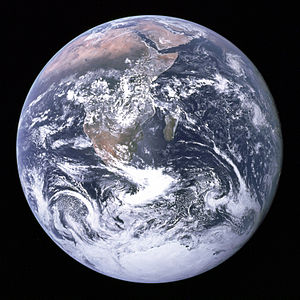Viewpoint: Can Pope Francis mobilise a community of over a billion Catholics to take action on climate change?

The Blue Marble - taken during Apollo 17 lunar mission 1972.
Next week Pope Francis is hosting a conference at the Vatican that will directly address the threats faced by humanity from a hotter planet. Devastating extreme weather events such as flooding and droughts are becoming increasingly more intense and will cause much hardship going forward. The major food producing regions of the world are now under growing pressure from water shortages, increases in pest outbreaks and other symptoms of a hotter world.
Science diagnoses the state of our environment
The oceans are acidifying and forests are dying. Whereas it used to be humans cutting down forests, now the dying off of forests is becoming a self-reinforcing feedback loop. The oceans and forests that used to digest the atmospheric carbon (carbon "sinks") and produce the oxygen we breathe, are now reversing and themselves becoming sources of carbon. Without carbon sinks, life for humans will become very difficult and eventually impossible.
Extrinsic Values
Scientists are now speaking loud and clear about the need to take action to make our cities and infrastructure more resilient to the growing threats from a range of impacts. However, their voices are often not heard because of the corporate mainstream media, which has ties to industries that make huge profits from the consumerist lifestyles that people in developed countries take for granted. By being "consumers" we do by default create a rift between who we are as beings and the ecology that underwrites our very existence.
The real damage here is that mass-consumerism is driving pollution and the needless extraction of limited resources, often simply to acquire objects we don't really need. After decades of this lifestyle the impact on the natural world has become too much.
Intrinsic values
Pope Francis and other faith leaders realise that the time has come to address the emergency we now face from a disrupted climate. As individuals of differing faiths and philosophies, we can all agree that a destructive life is not one that we can endorse and so change must happen fast.
For change to happen it will require that many of us look inside ourselves and assess our own intrinsic value system. What truly makes us happy? Can we really continue to consume the Earth's resources whilst over a billion people around the world experience worsening hardships due to the onset of extreme climate change? Can we communicate with our local political leaders and express our concerns about the environment? Can they tell us their policies and how they address these important issues?
Based on these questions, we can make it clear that our votes and our support are dependent on responsible policies formed in accordance with a healthier environment and a more equitable quality of life for all.
This is a global issue and one that transcends national borders and identities. History has shown that conflict increases when humanity is under stress, but we have a chance now to unite peacefully to tackle this global threat. The value in the peaceful path is not just idealistic rhetoric, rather it is the only chance we have to achieve a balance of justice and a minimal loss of life.
Supporting the papal encyclical
Pope Francis speaks to a Church that spans the entire globe. Joined with other faith leaders the influence extends to over half of the worlds human population. That is an astonishing figure. If every member of every faith community can become an agent of change then humanity will be able to avert the worst impacts of climate change. If not then we will see suffering on a scale beyond our worst nightmares. On this note I will end with a statement made by Pope Francis in February of this year: ".. a Christian who does not protect creation is a Christian who does not care about the work of God."
Nick Breeze is the Media Director of United Planet Faith & Science Initiative (www.upfsi.org) and also writes about climate change and produces filmed interviews at www.envisionation.co.uk.


















